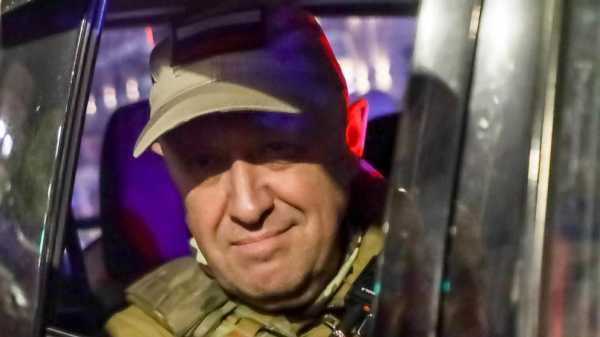
MOSCOW — A video released Wednesday appears to show Russian mercenary chief Yevgeny Prigozhin for the first time since he led a short-lived rebellion last month, and he is seen telling his troops they will spend some time in Belarus training its military before deploying to Africa.
Messaging app channels linked to Prigozhin’s Wagner private military company said he spoke at a field camp in Belarus and ran a blurry video purported to show him there, his silhouette seen against the sky at dusk. His gravelly voice was clearly distinguishable.
“Welcome guys! I am happy to greet you all. Welcome to the Belarusian land!" the video showed him saying. "We fought with dignity! We have done a lot for Russia.”
Prigozhin's mutiny, which posed the most serious threat to President Vladimir Putin’s 23-year rule, was billed by the mercenary chief as being aimed at ousting Russia’s top military leaders whom he accused of incompetence.
Prigozhin's criticism of the conduct of the fighting in Ukraine was repeated in the new video, the authenticity of which could not be immediately verified.
“What is going on the front line today is a shame in which we shouldn’t take part,” he said, adding that Wagner forces could return to Ukraine in the future.
“We may return to the special military operation when we feel sure that we will not be forced to put shame on ourselves,” Prigozhin said, using the same term that the Kremlin calls the fighting in Ukraine.
“We need to wait for the moment when we can show ourselves in full,” he said. “That is why a decision has been made that we would spend some time here in Belarus. During that time, we will make the Belarusian army the second strongest army in the world. We will train, raise our level and set off for a new journey to Africa.”
In addition to their involvement in Ukraine, Wagner mercenaries have been sent to Syria and several African countries since the private army was created in 2014.
Under the deal that was brokered by Belarusian President Alexander Lukashenko, Prigozhin agreed to end his rebellion in exchange for an amnesty for him and his fighters and a permission to relocate to Belarus.
Before moving to Belarus, Wagner handed over its weapons to the Russian military, part of efforts by Russian authorities to defuse the threat posed by the mercenaries.
Until the video was posted Wednesday, Prigozhin had released only a couple of audio messages after the mutiny — contrasting with an almost-daily barrage of blustery statements before the June 23-24 events. Some saw that as a sign the deal obliged him to cut his rhetoric and stay away from politics.
Starting last week, several Wagner convoys flying Russian flags and Wagner insignias have been seen rolling into Belarus, heading toward a field camp that Belarusian authorities had offered to the company.
Satellite photos from Planet Labs PBC and analyzed by The Associated Press showed a convoy of vehicles at the base near Tsel in the Asipovichy region of Belarus, about 90 kilometers (about 55 miles) southeast of Minsk. The photos taken Monday showed a long line of vehicles coming off a highway.
Belaruski Hajun, an activist group that monitors troops movements in Belarus, said several convoys with Wagner fighters have entered the country since last week, including at least 170 vehicles on Tuesday. It estimated that about 2,500 Wagner mercenaries are now in Belarus.
On Monday, a messaging app channel linked to the contractor ran a video showing Russian and Wagner flags lowered at the mercenaries’ main home base in Molkino in the Krasnodar region of southern Russia. The channel said that the base would close on July 30, and one of the mercenaries in the video declared that Wagner was moving to unspecified new locations. Wagner also has used camps in the Russia-occupied Luhansk region of Ukraine.
Prigozhin presented the flag to cheering mercenaries in the video posted Wednesday.
Prigozhin said Belarusians met them “not only like heroes, but like brothers” and added to their laughter that “local girls are whispering full of desire that Wagner troops have come. Be accurate not to offend any of them, let's treat them in a brotherly way.”
Lukashenko has said that his country’s military could benefit from the mercenaries’ combat experience and rejected claims that their presence could destabilize the ex-Soviet nation. Last week, Belarusian state TV broadcast video of Wagner instructors training Belarus’ territorial defense forces.
In his revolt that began on June 23 and lasted less than 24 hours, Prigozhin’s mercenaries swept through the southern Russian city of Rostov-on-Don and captured the military headquarters there without firing a shot, before moving as close as 200 kilometers (125 miles) of Moscow.
The mutiny faced little resistance and the mercenaries downed at least six military helicopters and a command post aircraft, killing at least 10 airmen.
Prigozhin had called it a “march of justice” to oust Defense Minister Sergei Shoigu and General Staff chief Gen. Valery Gerasimov, who demanded that Wagner forces sign contracts with the Defense Ministry. He ordered his troops back to their camps after striking the deal to end the rebellion, the terms of which have remained murky.
Putin has declared that Wagner troops had a choice between signing contracts with the Defense Ministry, moving to Belarus or retiring from service. He said last week that he met with Prigozhin and 34 Wagner officers on June 29 and offered them the option of continuing to serve as a single unit under their same commander.
Sourse: abcnews.go.com






